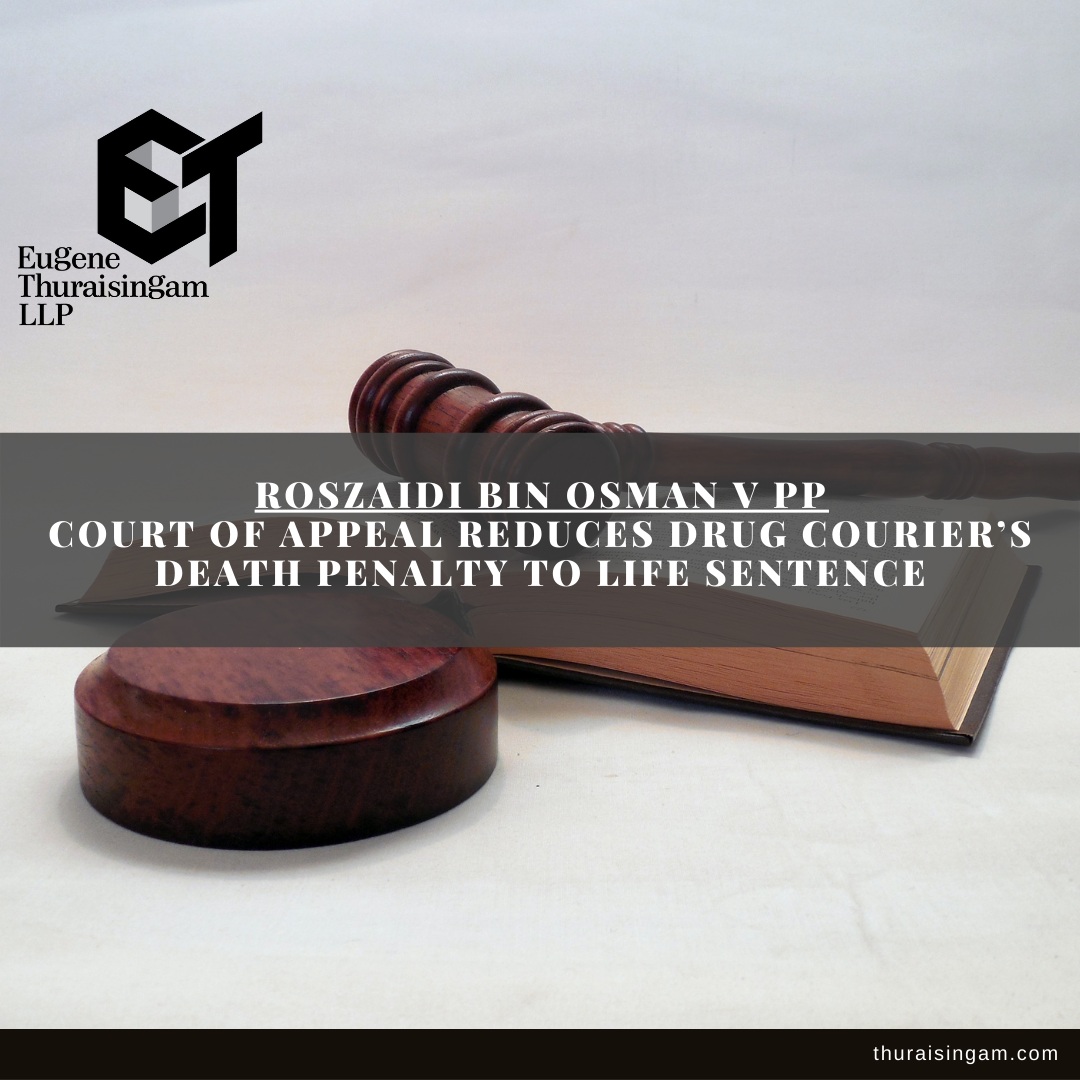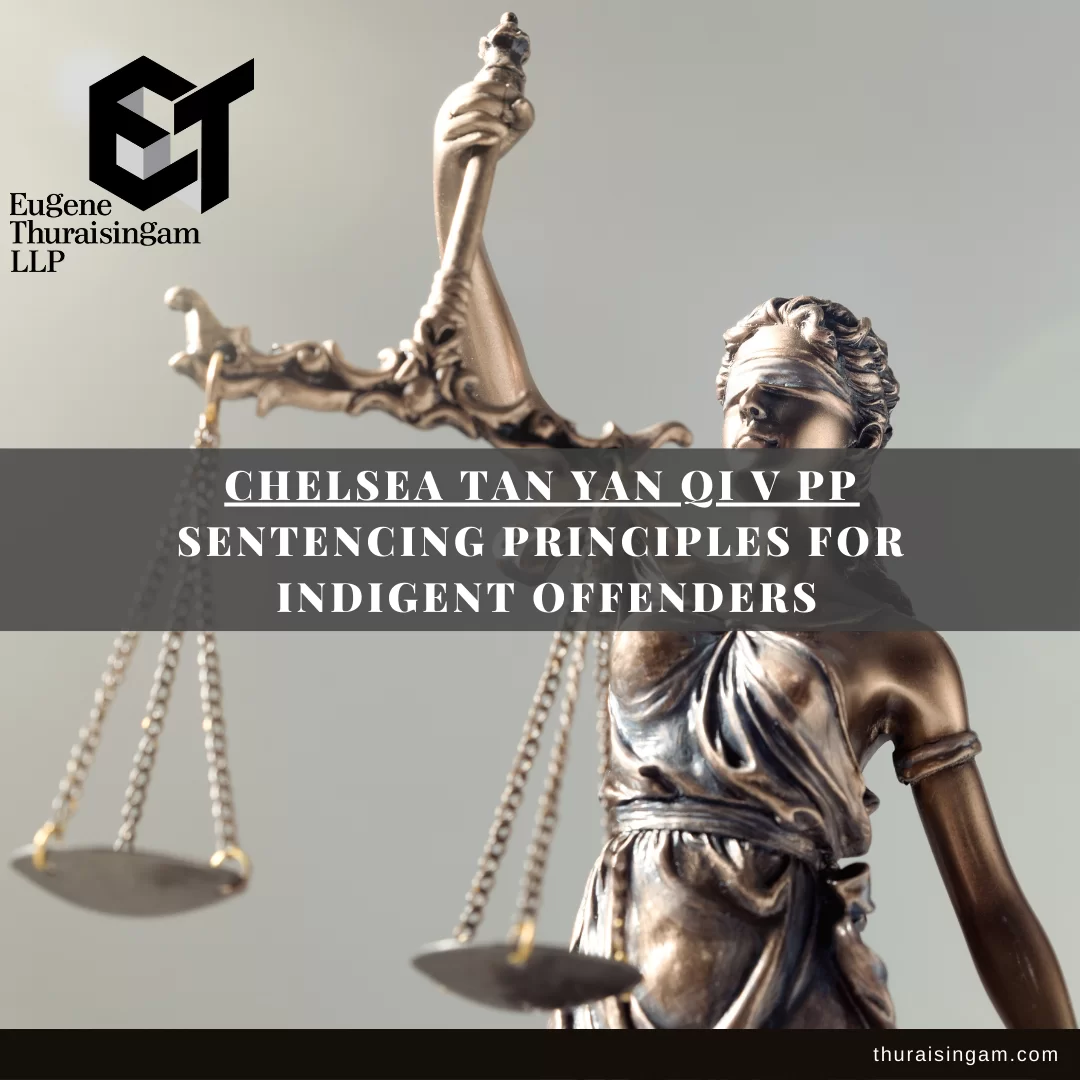Roszaidi bin Osman v PP – Court of Appeal Reduces Drug Courier’s Death Penalty to Life Sentence
Roszaidi Bin Osman V Public Prosecutor [2022] SGCA 75
1. Overview: Alternative Sentencing Regime for Drug Offences
When a person is convicted of an offence that attracts the death penalty under the Misuse of Drugs Act 1973, section 33B(1)(b) of the Act provides for an alternative sentencing regime where they can be re-sentenced to life imprisonment on the ground of diminished responsibility.
To be eligible, it must be proven on a balance of probabilities that they were a courier, and that they were suffering from an abnormality of mind that substantially impaired their mental responsibility for their acts and omissions.
The case of Roszaidi bin Osman v Public Prosecutor [2022] SGCA 75 concerned the Court of Appeal’s decision on whether Roszaidi, who was previously convicted of drug trafficking and sentenced to death, was eligible to be re-sentenced to life imprisonment.
Before we get into the Court of Appeal’s decision, it would be germane to first discuss the test for diminished responsibility, as well as the procedural history of Roszaidi’s case.
2. The Test for Diminished Responsibility
As it was previously established that Roszaidi was a courier, this case only focused on the question of whether he was suffering from an abnormality of mind that substantially impaired his mental responsibility for his acts and omissions in relation to his offence.
The relevant test comes from Nagaenthran a/l K Dharmalingam v Public Prosecutor and another appeal [2019] 2 SLR 216 (“the Nagaenthran test”).
These three cumulative requirements (or “limbs”) must be established on a balance of probabilities:
- First, that he was suffering from an abnormality of mind;
- Second, that the abnormality of mind (i) arose from a condition of arrested or retarded development of mind; (ii) arose from any inherent causes; or (iii) was induced by disease or injury; and
- Third, that the abnormality of mind substantially impaired his mental responsibility for his acts and omissions in relation to his offence.
3. Outcome at Remitted Hearing
Upon appeal against his initial conviction and sentence, Roszaidi’s case was remitted to the trial judge in the High Court for further psychiatric evidence to be taken so that his eligibility for the alternative sentencing regime could be properly evaluated.
Applying the Nagaenthran test, the judge found that the first limb was satisfied, as psychiatric experts from both the Prosecution and Defence agreed that Roszaidi suffered from major depressive disorder (MDD) and substance use disorder (SUD) at the time of his commission of the offence, and these were both “abnormalities of mind”.
For the second limb, the judge noted that both experts agreed that Roszaidi’s MDD arose from an inherent cause, and accordingly found that the second limb was satisfied in so far as his MDD was concerned. However, the judge found that there was nothing to show that Roszaidi’s SUD had arisen from any inherent cause and rejected the defence expert’s opinion that the two conditions had operated in a “synergistic” manner. Hence, Roszaidi’s SUD did not satisfy the second limb.
As only Roszaidi’s MDD satisfied the first and second limbs, the judge proceeded to consider whether his MDD alone had substantially impaired his mental responsibility for his acts and omissions in relation to his offence. The judge took the view that Roszaidi had made a “reasoned choice” and “conscious decision” to continue trafficking because he believed that its risks were outweighed by its rewards. In addition, the judge held that Roszaidi’s ability to execute tasks required to traffic the drugs (e.g., coordinate with people) evidenced his ability to think in a “logical and organised manner”. As such, Roszaidi’s MDD had not substantially impaired his mental responsibility.
Since the three limbs of the Nagaenthran test had not been satisfied, the trial judge declined to re-sentence Roszaidi to life imprisonment.
4. The Court of Appeal’s Findings
In a 3-2 decision, the Court of Appeal overturned Roszaidi’s death sentence and re-sentenced him to life imprisonment. Once again, the first limb of the Nagaenthran test was not in dispute, but there was disagreement between the majority and minority on the second and third limb. Overall, the minority seemed to prefer the trial judge’s approach.
The second limb
For the second limb, the majority accepted that Roszaidi’s MDD, which was triggered by the death of his mother and grandmother, led to escalating drug abuse and exacerbated the gravity and effects of his SUD. Due to the interaction of his MDD and SUD in this manner, the majority concluded that since his MDD arose from an inherent cause, his SUD also arose from an inherent cause. As such, the second limb was satisfied by both conditions operating together at the material time.
The minority disagreed, stating that Roszaidi had not adduced sufficient evidence to prove the existence of a causal link between his MDD and his escalating drug consumption.
The third limb
Given their finding on the second limb, the majority proceeded on the basis that the inquiry was directed at whether the combination of Roszaidi’s MDD and SUD had substantially impaired his mental responsibility.
In their analysis, they referenced the case of Ahmed Salim v Public Prosecutor [2022] SGCA 6, which involved diminished responsibility as a partial defence to murder. The case is instructive as the principles relevant to diminished responsibility in the context of drug offences are similar.
In Ahmed Salim, the Court of Appeal drew a distinction between the accused person’s execution of a murder and their prior decision to commit the murder. It was held that even when the accused person executed a murder in accordance with a premeditated plan, diminished responsibility may be made out if he can prove that his mental disorder “substantially impaired his ability to make rational or logical decisions, and this disorder caused him to decide to kill the victim”. The Court considered that the prior decision to kill would itself be “the product of a disordered mind, which is not functioning rationally”.
In Roszaidi’s case, the majority sought to draw this same distinction by considering his mental responsibility in relation to the act of giving two packets of drugs to his wife separately from his prior decision to traffic drugs.
The majority held that when he gave the two packets of drugs to his wife, he was more likely than not to have been materially influenced by his MDD and SUD. It appeared to be an impulsive and irrational decision, and his MDD may have caused paranoia about being harmed if he threw away the drugs. He was also under the influence of drugs at the time.
As for the prior decision to traffic drugs, Roszaidi was not able to exercise control over his actions by reason of his overwhelming need to obtain and consume drugs due to his MDD and SUD. This is supported by evidence that he never had the money to pay for drugs and relied on taking some drugs from the consignments that he trafficked.
As a result, the majority held that the third limb was satisfied as Roszaidi’s mental responsibility was substantially impaired by his MDD and SUD.
The minority disagreed, stating that Roszaidi’s rational judgment was not sufficiently impaired at the time, and that he was thinking in a logical and organised manner.
The relevance of rationality
The majority made a point that it was unhelpful to use rationality as a touchstone to guide the overall analysis of impairment. As in Ahmed Salim, they believed that if the accused person’s prior decision to commit the offence was in truth “the product of a disordered mind” which was not functioning rationally in the first place, then his seeming rationality while following through with that decision will not necessarily displace the availability of the alternative sentencing regime.
5. Conclusion
This case sets an important precedent for the assessment of diminished responsibility when determining whether an accused is eligible for the alternative sentencing regime under section 33B(1)(b). The Court held that even if the accused person’s execution of an act in relation to their offence appears to be rational, if their mental responsibility for their prior decision to commit the act was substantially impaired, the alternative sentencing regime may still be available to them.
The case also emphasises the importance of psychiatric evidence in determining the relevant mental conditions that the court will take into account when making an assessment of substantial impairment.
Our team acting for Roszaidi includes Eugene Thuraisingam, Suang Wijaya and Johannes Hadi. We also received invaluable assistance from LASCO-appointed assisting counsels Mr Abdul Rahman bin Mohd Hanipah of Abdul Rahman Law Corporation, and Ms Shobna Chandran and Mr Thaddaeus Aaron Tan Yong Zhong of Tan Rajah & Cheah. You may read the Court of Appeal’s decision in full at this link.







